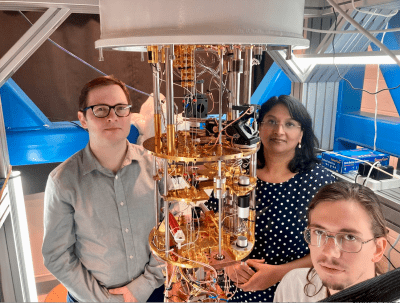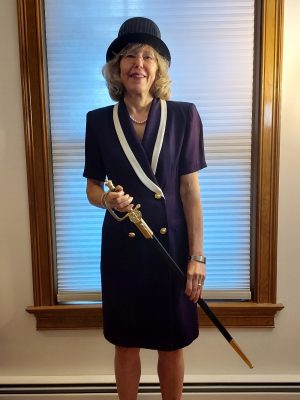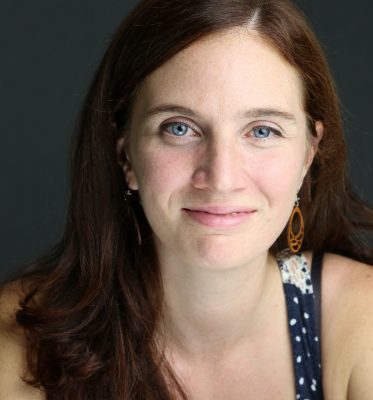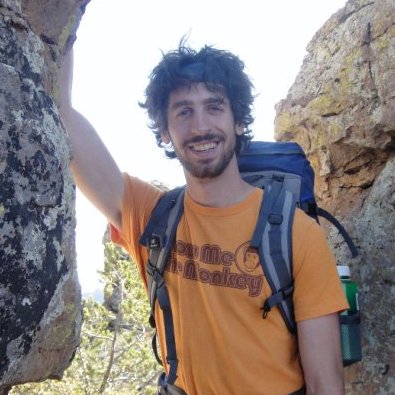Second-year graduate student Andrea Mejia received in Fall 2022 the CT Space Grant Award for her Graduate Research on “Constraining Black Hole Binaries and Mergers” where she studies, by means of numerical simulations, how Active Galactic Nuclei form and eventually merge stellar mass black hole binaries, see https://ctspacegrant.org/funding-programs/faculty/past-recipients. In addition, Andrea successfully secured in May 2023 an ACCESS Explore Grant. These grants are designed specifically for graduate students in need of advanced computing and data resources for research purposes. Andrea’s grant provides 716,800 cpu-hours on high-performance computing systems to be used by May 2024. Originating from Andrea’s undergraduate research at her prior institution, Hunter College, this well-funded research will help to interpret data on gravitational waves from black hole mergers observed by LIGO and VIRGO. For her graduate studies at UConn, however, Andrea plans to pursue a different career path and switch from mergers of stellar mass black holes in theoretical astrophysics to collisions of subatomic particles in theoretical particle and nuclear physics.
Awards
Reports on awards, grants, and other forms of recognition received by members of the Physics Department.
Prof. Mingarelli is the runner up of Inspiring Women in Science awards
Prof. Chiara Mingarelli is the Inspiring Women in Science awards 2022 Scientific Achievement Runner-Up.
The Inspiring Women in Science awards celebrate and support the achievements of women in science, and all those who work to encourage girls and young women to engage with STEM subjects and stay in STEM careers around the world.
For more information read the press release
NSF award to Profs. Jain and Sochnikov
 Professors Jain and Sochnikov received NSF research grant entitled “New Quantum Elastocaloric Demagnetization Refrigeration for the Millikelvin Range”. A major focus of their research will be the cooling of quantum chips. For this purpose, their teams will study ‘spin liquids’, which can be harnessed to achieve millikelvin temperatures without magnetic fields. At such low temperatures, quantum phase transitions drive cryocooling. This research uses novel techniques to induce and tune these types of phase transitions. In the future, this research will transform our ability to build energy-efficient, large-scale quantum computers.
Professors Jain and Sochnikov received NSF research grant entitled “New Quantum Elastocaloric Demagnetization Refrigeration for the Millikelvin Range”. A major focus of their research will be the cooling of quantum chips. For this purpose, their teams will study ‘spin liquids’, which can be harnessed to achieve millikelvin temperatures without magnetic fields. At such low temperatures, quantum phase transitions drive cryocooling. This research uses novel techniques to induce and tune these types of phase transitions. In the future, this research will transform our ability to build energy-efficient, large-scale quantum computers.
Prof. Nora Berrah received the Honorary Doctoral Degree
Prof. Nora Berrah received the Honorary Doctoral Degree from the University of Turku in Finland. The ceremonial conferment was on October 8, 2021. This honor comes with the University of Turku Doctoral Certificate as well as a “Hat and a Sword”, the latter symbolizing the “Doctors’ Rank but also Sharpness of Thought and Role in Defending Science”. A picture of the hat and sword is shown.

UConn Physics Students Awarded Direct Energy Professional Society Scholarship
Two UConn Physics graduate students were recently awarded the Directed Energy Professional Society (DEPS) scholarship to support their work in the field of directed energy. Brandin Davis and Zhanna Rodnova received awards for their research on developing long-wavelength infra-red radiation sources. They were among 20 national winners. DEPS awards students scholarships of up to $10,000 to students carrying out promising research in directed energy technology, high-power laser development, high-power microwaves, and ultrashort pulse lasers. Brandin and Zhanna are both part of Prof. Carlos Trallero’s research group, which focuses on studies of light-matter interaction using high-power ultrashort pulse lasers.
Physics Prof. Tom Blum recognized for Research Excellence
Prof. Thomas Blum is one of two faculty to receive the Research Excellence award from the University of Connecticut in 2022. Tom came to UConn in 2004 and is a professor and associate department head for undergraduate education in the Physics Department. As a theoretical physicist, Blum specializes in making difficult, detailed mathematical calculations concerning how basic theories of physics, such as quantum mechanics, play out in setting the properties and behavior of matter, in his case the tiniest particles known. Notably, Blum is able to figure out how to perform calculations that others have found not possible. He has held visiting professorships at KEK in Japan, CERN in Switzerland, and the Helmholtz Institute in Germany. He has also won research awards including an Outstanding Junior Investigator award from the US Department of Energy, the Ken Wilson Award (top award in his subfield), is a Fellow of the American Physical Society, and was named a Fermilab Distinguished Scholar. At the same time, he is also a dedicated mentor, who supports the development of junior colleagues, and undergraduate and graduate students.
Prof. Cara Battersby Awarded an NSF CAREER grant
 Professor Cara Battersby has been awarded an NSF CAREER grant! “The Faculty Early Career Development (CAREER) Program is a Foundation-wide activity that offers the National Science Foundation’s most prestigious awards in support of early-career faculty who have the potential to serve as academic role models in research and education and to lead advances in the mission of their department or organization.”
Professor Cara Battersby has been awarded an NSF CAREER grant! “The Faculty Early Career Development (CAREER) Program is a Foundation-wide activity that offers the National Science Foundation’s most prestigious awards in support of early-career faculty who have the potential to serve as academic role models in research and education and to lead advances in the mission of their department or organization.”
Prof. Battersby’s CAREER Award is entitled “CAREER: Shining STARs Amidst the Turbulence” and is an ambitious project to complete the first-ever systematic study of turbulence in an extreme environment, the center of our galaxy. Turbulence is poorly understood yet plays a pivotal role in the setting the Initial Mass Function (IMF), which underpins all of modern astrophysics. The results from this research will be brought into under-resourced high school classrooms through lesson plans jointly developed by K-12 teachers and undergraduate students from traditionally under-represented groups. Battersby aims to recruit and retain students from under-represented groups in STEM through a new mentorship program UConn-STARs.
Prof. Chiara Mingarelli awarded NSF grant
Chiara Mingarelli, Assistant Professor of Physics at UConn, is the lead researcher on a $650,000 Collaborative Research Grant from the National Science Foundation, half of which is earmarked for UConn, to conduct an experiment to prove the existence of supermassive black hole binaries. This grant will combine, for the first time, traditional astronomy with gravitational wave astronomy.
“This project is really setting up a whole new way to think about low-frequency gravitational-wave and extragalactic astronomy,” Mingarelli says. “With our new method, not only can we make predictions about the amplitude of the gravitational wave background, but we can also make predictions of where the likeliest and closest supermassive black hole systems are.”
For more information about Prof. Mingarelli research, see the recent article in UConn Today.
Professor Nora Berrah Awarded a Blaise Pascal Chaire d’Excellence to Conduct Research in France
Professor of Physics Nora Berrah has been awarded the International Blaise Pascal Chaire d’Excellence, a prestigious honor whose previous winners include scientists and scholars from a wide range of disciplines, including multiple Nobel laureates. Her award was selected by a committee of scientists and voted on by the Permanent Commission Regional Council of the Région Île-de-France.
This award is bestowed to scientists of international reputation who are invited to conduct research in the Paris area. The goal is to establish international collaborations and exchange, as well as share science globally. In Berrah’s case, the collaboration is between UConn and the Commissariat à l’énergie atomique et aux énergies alternatives de Saclay (CEA, Paris Saclay). The collaborative work is aimed to push the frontiers of science, as well as enrich and facilitate international research.
The Région Île-de-France selects every year four laureates of high international standing in their field of expertise. All research areas are included, such as the humanities, arts, and sciences, in the selection of the awardees. Six Nobel laureates have been selected for the award since 1996. Prof. Berrah was selected by the Blaise Pascal Chaire Committee for the field of Fundamental Physics.
For more information about Professor Berrah’ award, see the article in UConn Today
Jonathan Trump wins NSF Early Career Award
 Jonathan Trump, Assistant Professor of Physics, will receive $738,090 over five years to compile a census of supermassive black holes in the universe. This will give insights into how supermassive black holes and galaxies evolve across cosmic time. Trump will also develop a bridge program for underrepresented undergraduate physics majors at UConn to increase their participation in STEM fields.
Jonathan Trump, Assistant Professor of Physics, will receive $738,090 over five years to compile a census of supermassive black holes in the universe. This will give insights into how supermassive black holes and galaxies evolve across cosmic time. Trump will also develop a bridge program for underrepresented undergraduate physics majors at UConn to increase their participation in STEM fields.